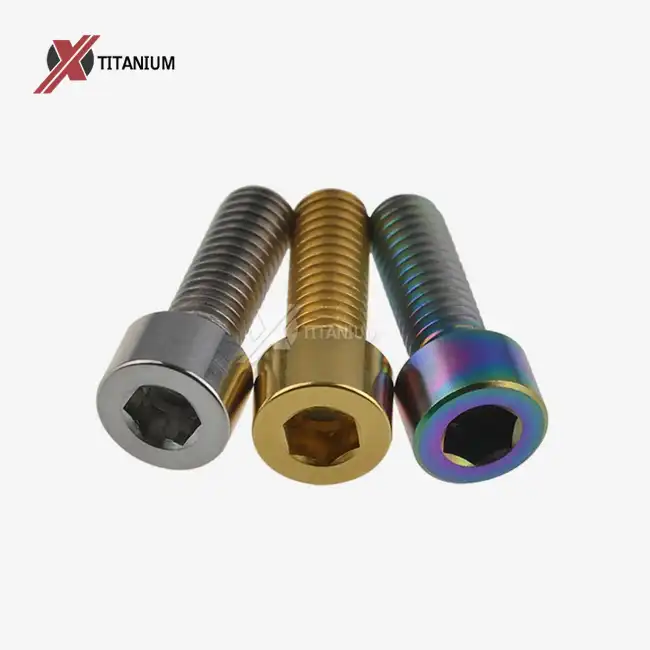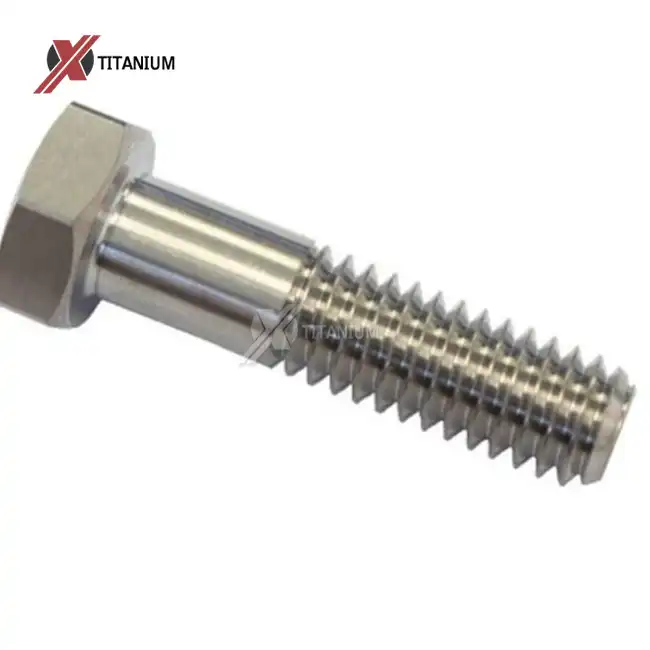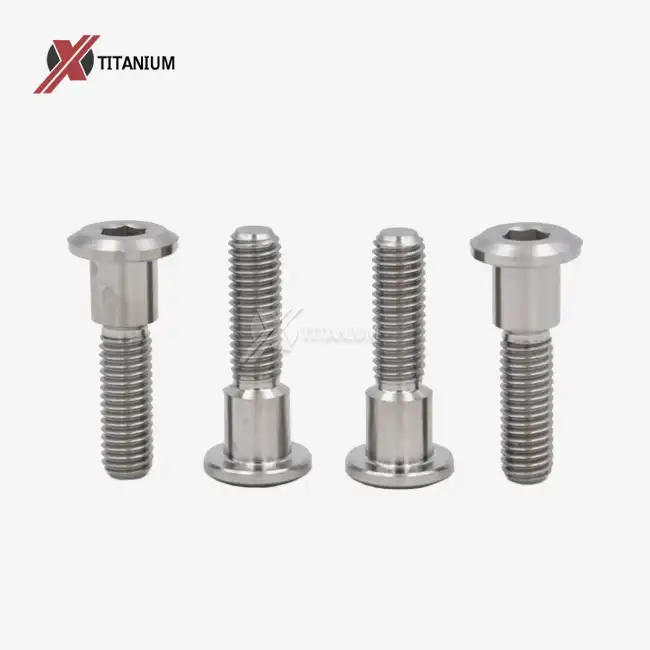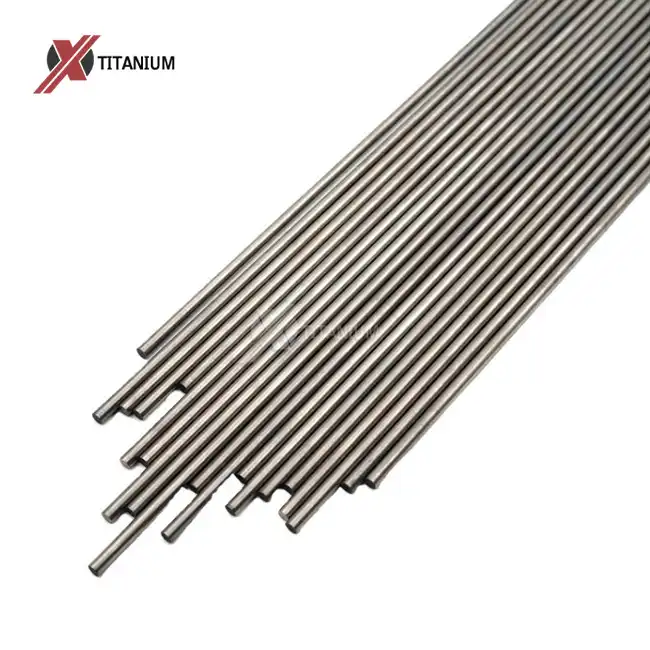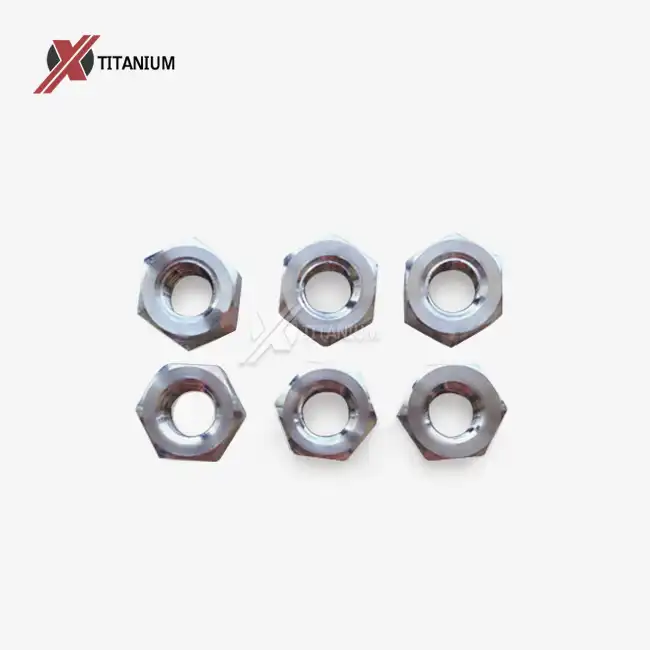The Science Behind Titanium's Rust Resistance
To truly appreciate why Gr5 titanium bicycle screws and other titanium fasteners don't rust, it's essential to delve into the science behind this phenomenon. Titanium's unique properties stem from its atomic structure and chemical behavior.
Titanium's Protective Oxide Layer
When exposed to oxygen, titanium rapidly forms a thin, transparent layer of titanium dioxide (TiO2) on its surface. This process, known as passivation, occurs almost instantaneously. The resulting oxide film is incredibly stable and tightly adhered to the underlying metal, creating an impenetrable barrier against further oxidation.
This protective layer is what gives titanium its exceptional corrosion resistance. Even if the surface is scratched or damaged, the oxide layer quickly reforms, maintaining the metal's integrity. This self-healing property is particularly beneficial for Gr5 titanium bicycle screws, which may be subjected to various environmental stresses during use.
Electrochemical Properties of Titanium
Titanium's resistance to rust is also attributed to its electrochemical properties. In the galvanic series, titanium is more noble than many other metals, including steel and aluminum. This means that in a corrosive environment, titanium is less likely to undergo oxidation reactions, further contributing to its rust-resistant nature.
For Gr5 titanium bicycle screws, this electrochemical stability is crucial. It ensures that the screws remain intact and functional even when exposed to moisture, sweat, or other potentially corrosive substances encountered during cycling.
Advantages of Gr5 Titanium Bicycle Screws
While rust resistance is a significant benefit of using titanium screws in bicycles, it's far from the only advantage. Gr5 titanium, also known as Ti-6Al-4V, offers a unique combination of properties that make it ideal for high-performance cycling applications.
Exceptional Strength-to-Weight Ratio
Gr5 titanium bicycle screws offer a remarkable strength-to-weight ratio, making them ideal for reducing bike weight without sacrificing performance. Being about 45% lighter than steel, yet comparably strong, these screws help cyclists achieve faster acceleration and easier climbing. This advantage is especially valuable in competitive cycling, where even small weight savings can translate to meaningful performance gains. The reduced mass also improves handling and responsiveness, enhancing the overall riding experience.
Fatigue Resistance
The superior fatigue resistance of Gr5 titanium makes it a standout choice for bicycle screws. These screws endure repetitive loads and vibrations that come with everyday and high-intensity riding. Unlike some metals that weaken over time, Gr5 titanium maintains its mechanical strength even after countless stress cycles. This durability ensures long-term reliability, reducing the likelihood of component failure and minimizing the need for frequent replacements, which is essential for demanding cyclists and rugged terrain.
Biocompatibility
Although not directly linked to performance, the biocompatibility of Gr5 titanium is a valuable benefit. In the event of skin exposure—through accidents or frequent handling—this alloy is highly unlikely to cause allergic reactions or irritation. For cyclists with metal sensitivities, this makes Gr5 titanium a safer alternative to other materials. Additionally, its non-toxic nature adds peace of mind, particularly when using screws near contact points like handlebars or saddle assemblies.
Maintenance and Care of Gr5 Titanium Bicycle Screws
Despite their inherent rust resistance and durability, proper maintenance can further extend the lifespan and performance of Gr5 titanium bicycle screws. Here are some tips for caring for these high-performance components:
Cleaning and Inspection
Regular cleaning of your bike, including Gr5 titanium screws, helps prevent buildup of dirt and debris that can cause wear over time. Use a soft brush or cloth with mild soap and water to gently clean the screws and surrounding areas. After cleaning, closely inspect each screw for signs of mechanical wear, such as thread damage or deformation. Early detection of potential issues ensures continued performance and prevents unexpected failures during rides.
Proper Torque Application
Applying the correct torque when installing or adjusting Gr5 titanium bicycle screws is essential for maintaining their performance and safety. Over-tightening can lead to micro-cracks or stress concentration, while under-tightening may cause the screws to loosen with vibration or movement. Always use a torque wrench for accuracy, and refer to your bike’s service manual or consult a professional to ensure that torque values match the manufacturer’s recommendations for each specific component.
Avoiding Galvanic Corrosion
Though titanium resists corrosion exceptionally well, it can create a galvanic cell when in contact with dissimilar metals, especially in moist or salty conditions. To minimize this risk, avoid pairing titanium screws with reactive metals like aluminum without proper isolation. Use plastic washers, anti-seize compounds, or anodized spacers to create a barrier. These preventive steps protect both the titanium and surrounding components, especially in coastal or humid environments where galvanic reactions are more likely.
Long-term Storage Considerations
When storing your bicycle for extended periods, ensure it is kept in a dry, well-ventilated environment to protect all components. While Gr5 titanium screws do not rust, moisture can affect other metals and materials in contact with them. Cover your bike with a breathable fabric cover to prevent dust accumulation and avoid damp basements or sheds. Periodically check the screws and other parts during storage to ensure no environmental damage has occurred.
Conclusion
Gr5 titanium bicycle screws offer exceptional rust resistance along with a host of other benefits that make them ideal for high-performance cycling applications. Their unique properties, including corrosion resistance, high strength-to-weight ratio, and durability, contribute to improved bicycle performance and longevity. By understanding the science behind titanium's rust resistance and following proper maintenance practices, cyclists can fully leverage the advantages of these premium components.
For more information about Gr5 titanium bicycle screws and other titanium products, please contact us at info@cltifastener.com or djy6580@aliyun.com. Our team at Baoji Chuanglian New Metal Material Co., Ltd. is ready to assist you with all your titanium needs.
